Did you know that over 57% of marketers are already using ChatGPT for SEO? ChatGPT isn’t just another tool; it’s the most widely used AI solution among SEO experts today, so much so that the term ChatGPT SEO has become a thing.
Whether you want to optimize for rankings, repurpose content, get deep data insights, or understand user intent, ChatGPT offers practical, cost-effective solutions. It’s especially valuable for entrepreneurs and small businesses that want to make big moves without big budgets.
The best part is that ChatGPT doesn’t only assist you in the earlier steps, such as simple research. It goes a step further, helping in SEO execution, too. We’re talking content clustering, internal linking suggestions, international SEO, multilingual keyword translation, and so on. Let’s take a closer look at ChatGPT’s capabilities and how you can benefit from them to their utmost potential.
- AI-Powered Content Clustering and Topic Authority Building
- Advanced Internal Linking Structures to Boost Authority Distribution
- Competitive Gap Analysis for Content and Keywords
- AI-Enhanced Content Repurposing for SEO
- AI-Powered User Behavior Analysis and SEO Strategy Adjustment
- AI-Driven Multilingual and International SEO Strategies
- Enhancing SEO Performance: Metrics and Optimization
- Optimizing Content Strategy with ChatGPT
- Potential Drawbacks and Limitations of ChatGPT in Advanced SEO
- Rank It Up With ChatGPT SEO
- Frequently Asked Questions
AI-Powered Content Clustering and Topic Authority Building
When building topical authority, you're basically trying to be the go-to resource for a particular topic. Your content needs to be comprehensive, well-researched, and informative—essentially the most authoritative piece on the topic.
To reach this point, you need to cover the topic as a whole and not just focus on individual keywords. If you've ever noticed websites with a low domain rating ranking above those with a higher domain rating, it's probably because of topical authority. They do this by creating a network of interconnected content that covers the topic from every angle.
You can do this by first conducting keyword research and then letting ChatGPT create content clusters so that you can write about a topic comprehensively. A content cluster basically consists of a pillar page that covers the topic broadly and then links to cluster pages that go into specific aspects.
Start with the Semrush Keyword Magic Tool. It will provide you with up-to-date, real-time keyword research data that you can export into a CSV or Excel file.
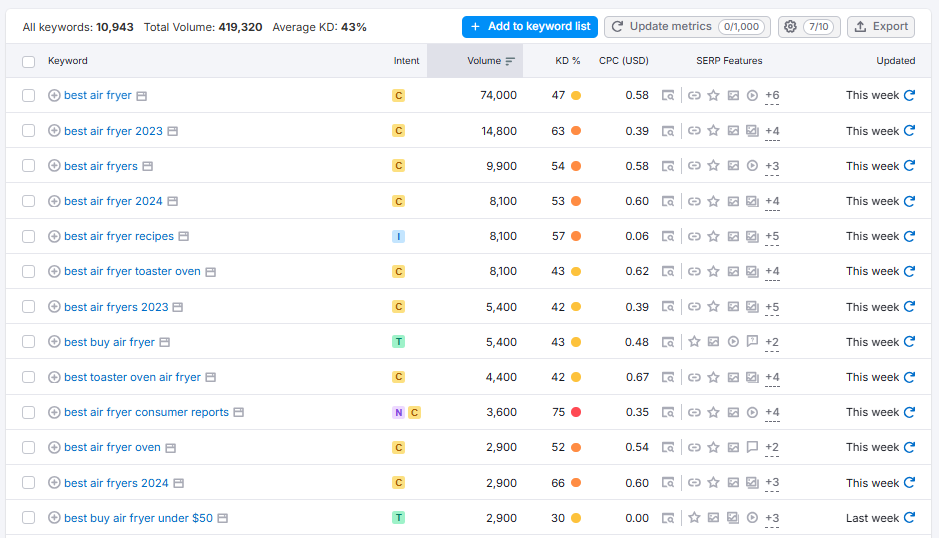
Semrush keyword tool
Then, you can upload this file to ChatGPT and use this prompt to generate content clusters:
Create content clusters based on user intent and semantic relatedness of keywords using the provided data.
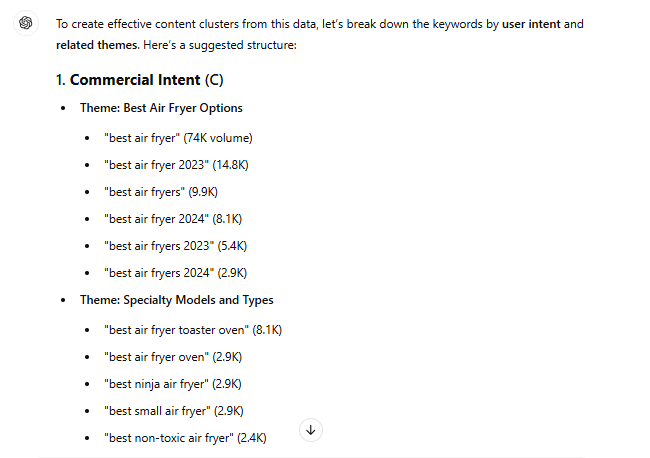
ChatGPT output
ChatGPT will categorize topics under the main pillar pages. In our example, ChatGPT has divided content under different intents. Let's take commercial intent. The pillar page can be ''Best Air Fryers of 2024'', and then you can add sub-pages like consumer reports, trusted brands, air fryer types, and specialty models. Interlink these pages to create a cohesive network of content that establishes topical authority.
However, note that ChatGPT comes with several limitations. For one, it can handle only a limited number of keywords in a single prompt. So, for complex campaigns requiring extensive keyword analysis, ChatGPT might fall short, necessitating supplemental tools or manual work to achieve thorough results.
Another issue lies in its struggles with semantic understanding, particularly when categorizing content like educational articles. If the relationship between keywords is loosely connected or contextually subtle, ChatGPT can misinterpret the intended structure or themes. In these cases, it may not be so reliable, requiring human oversight.
Advanced Internal Linking Structures to Boost Authority Distribution
Internal links are imperative for SEO for three reasons: they contextualize your site structure for search engines, they pass authority, and they allow easy navigation for users. Google explains how this works,
''Some pages are known because Google has already visited them. Other pages are discovered when Google follows a link from a known page to a new page.''
What you need to do is distribute authority throughout your website by internal linking, trying to improve the ranking of every page. Typically, pillar pages get more backlinks than individual blog posts or sub-pages. Similarly, link magnets on your site also tend to generate more backlinks.
Google sees these backlinks as a ''thumbs up'' from other websites, vouching for your content's quality. You can benefit from this credibility by passing on the link equity to your other pages.
ChatGPT can help you here by suggesting which long-tail keywords to use as anchor texts. Feed the article you’ve written to ChatGPT and use this prompt to get the tool to suggest ideal anchor texts.
Analyze this text and suggest the best anchor texts for internal linking.
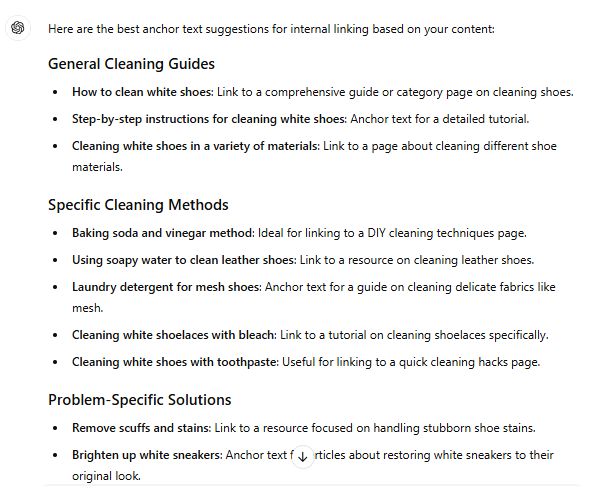
ChatGPT output
One way to pass link equity throughout your website is to create internal links in the pillar page leading to its relevant sub-pages. This way, the high authority of the pillar page is passed on to the related sub-pages, especially those focused on boosting conversions.
The way you place these links within the content has to be strategic, too. It shouldn't look spammy or forced. Instead, it should flow naturally within the text and add value to the reader's experience. Again, ChatGPT can assist.
Upload your content to ChatGPT and ask for the best link placements. However, note that you should check all these links to make sure they’re active before using them in your content. Since ChatGPT cannot check a link’s status, it may bring up URls with redirects or 404 errors.
Here's a prompt to use:
Suggest ideal link placements for the following links in my content to improve authority distribution and crawlability.
[Link 1]
[Link 2]
[Link 3]
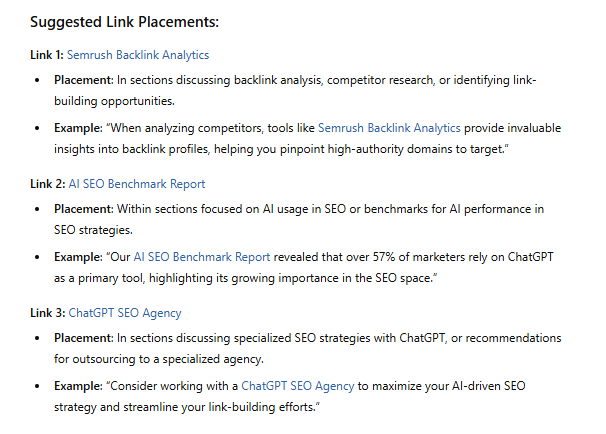
ChatGPT SEO
If you're unsure about the pages on the website carrying high link equity, use the Semrush Backlink Analytics tool to find them. Go to the Indexed Pages to find web pages with the highest number of backlinks. Export this data and then focus on adding internal links within these pages to their link equity to other pages that may be in need of a boost.
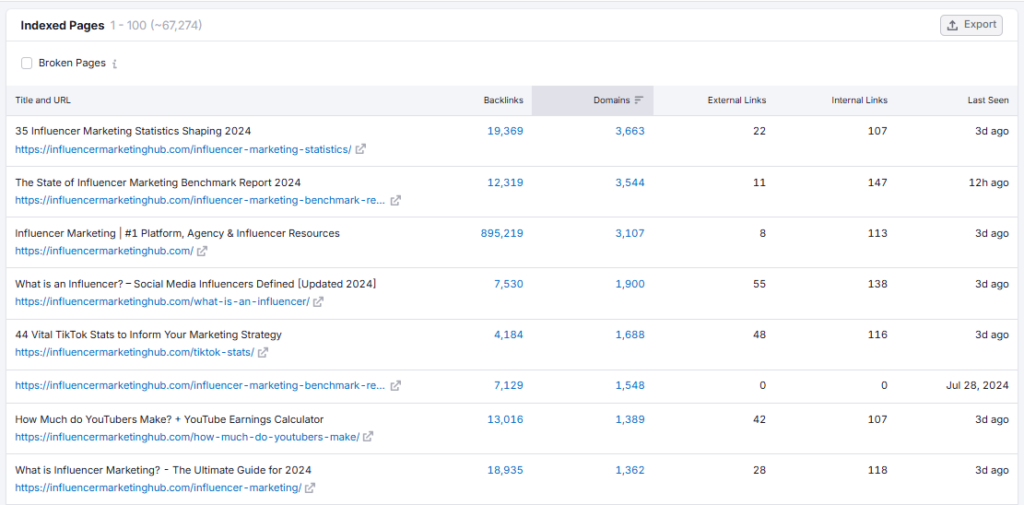
Semrush backlink analytics tool
The prompt above can help you use ChatGPT to determine the best places in these high-authority content pieces to add internal links to other web pages.
Competitive Gap Analysis for Content and Keywords
Just like you use the Semrush Keyword Gap tool to find competitor content clusters, you can leverage it for gap analysis to find keywords you're not tapping, but your competitors may be ranking for.
Semrush also shows you keywords that both you and your competitor are using, but you rank lower than them in the SERPs. Filter the results by selecting ''Weak'' to see this list. It's likely that your content doesn't rank as well because it's not as comprehensive or relevant as your competitor's.
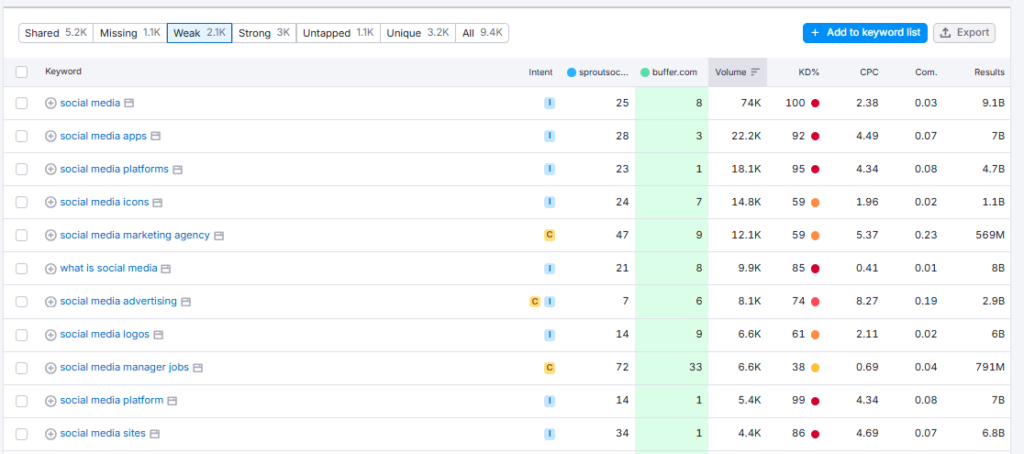
Keyword Gap tool
ChatGPT can help you determine what might be missing in your content. There are two ways to go about this. One, you can create a custom GPT if you have the expertise to do so. Alternatively, select a SERP analysis GPT from the GPT store. We’ll use Data Analysis SERP for the examples below.
Then, feed the custom GPT results for your seed keyword. You can include the top 10 ranking results to get detailed insights. Then, use this prompt to conduct a SERP analysis. You can further customize it to find anything search result-related, such as target audience, user intent, and content gaps.
Perform a detailed analysis of these SERP results and identify the target audience and the user intent for this content.
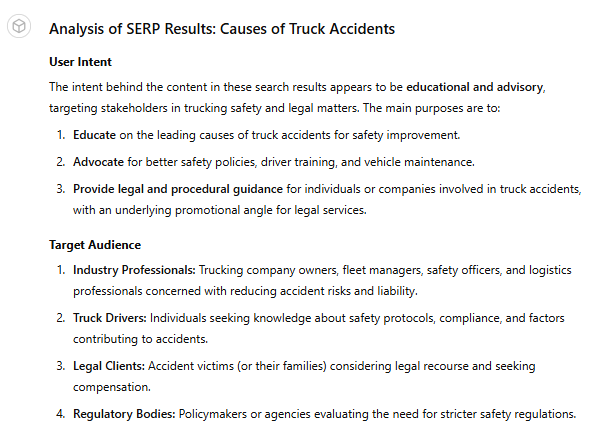
ChatGPT output
ChatGPT also highlights reader pain points that you can keep in consideration when you’re writing the article to ensure you’re really catering to the audience’s requirements.

ChatGPT output
Let’s say you’ve already written the content and it’s not doing as well as you want it to, ChatGPT can help you identify gaps in your article. For this, you should feed those articles to the SERP GPT that are outranking yours on the SERPs. First, feed your own article to the GPT and let it know that this is yours.
Then, enter well-ranking competitor articles, and use this prompt:
Analyze the following article and identify content gaps between my article and this one. Suggest improvements I can make in my content to fill these gaps.
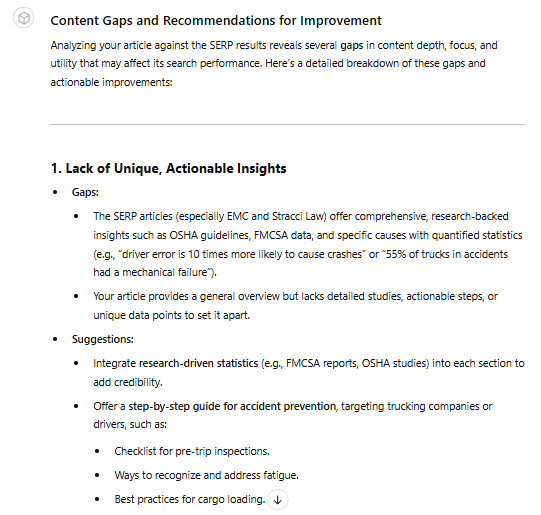
ChatGPT output
If you’re entering more than one competitor article, customize the prompt accordingly. Use the insights you get from the SERP GPT to add the missing content. Make sure it aligns with the pain points, target audience, and user intent SERP analysis GPT has identified above.
AI-Enhanced Content Repurposing for SEO
ChatGPT also does a great job of repurposing content, whether it’s for a new pain point or target audience. You can even use it to convert long-form content into smaller answers for FAQs or social media captions.
For example, ChatGPT can create direct and concise content (from an existing article) that could appear in rich results. Input an article into ChatGPT and use this prompt:
Rewrite this section to optimize it for a featured snippet. Take a direct approach and answer the question, "What is a SaaS tool?''
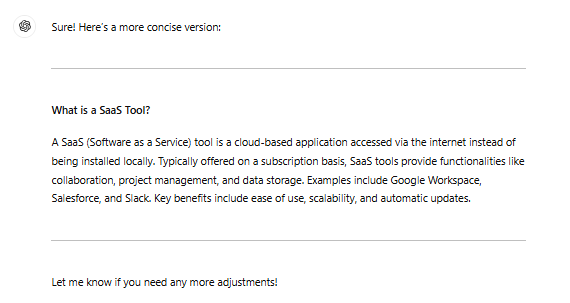
ChatGPT output
Now that Google has also introduced AI Overviews, you cannot think about SEO in silo. It has to be combined with search generative experience optimization, and an important aspect in this department is the creation of content that can appear in generative results.
ChatGPT can help you optimize existing content for these rich results. Again, input an article and use this prompt to repurpose its content for AI Overviews.
Analyze this article to identify the parts with the highest potential for appearing in AI-powered SERP features. Optimize those content sections accordingly.
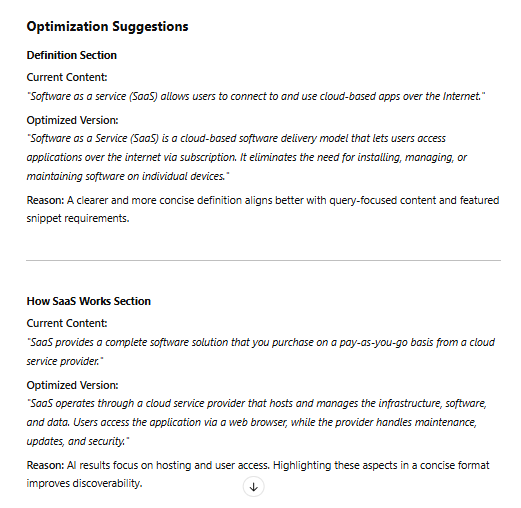
ChatGPT output
If your query already shows AI Overview results, you can also feed them to ChatGPT to show what's currently ranking. This will give the tool more context to work with.
Similarly, if the SERP analysis shows you that one of your target audience’s pain points has changed, you can ask ChatGPT to repurpose the section where you addressed it in your existing content. This works best for smaller sections. However, if you plan to make bigger changes using ChatGPT, make sure you review and edit it manually.
To do this, feed your article to ChatGPT and tell it about the new pain point. You can then let the tool select which sections to repurpose or specifically instruct it to repurpose a certain area or paragraph. For example, we fed ChatGPT a buying guide on air purifiers and asked it to repurpose the HEPA filter section for a new pain point: sensitivities and allergies.
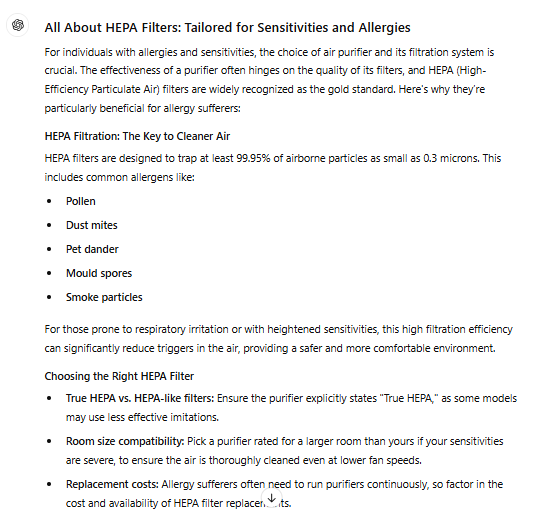
ChatGPT output
How to Identify Content Worth Repurposing
For smaller websites, a manual review of all content may be possible. However, for larger websites with thousands of articles and pages, it can be overwhelming to manually go through each piece of content and see which posts have the potential to be repurposed for other formats and platforms, such as social media posts and email newsletters.
The alternative is Semrush's Position Tracking tool. Use it to track keyword rankings for your website. From there, you can identify which pages have spiked in rankings and prioritize repurposing them. Since it updates every 24 to 48 hours, you’re always on top of keyword ranking fluctuations.
You can also integrate Google Analytics within Semrush to see which pages have high traffic and engagement, which can indicate well-performing content.
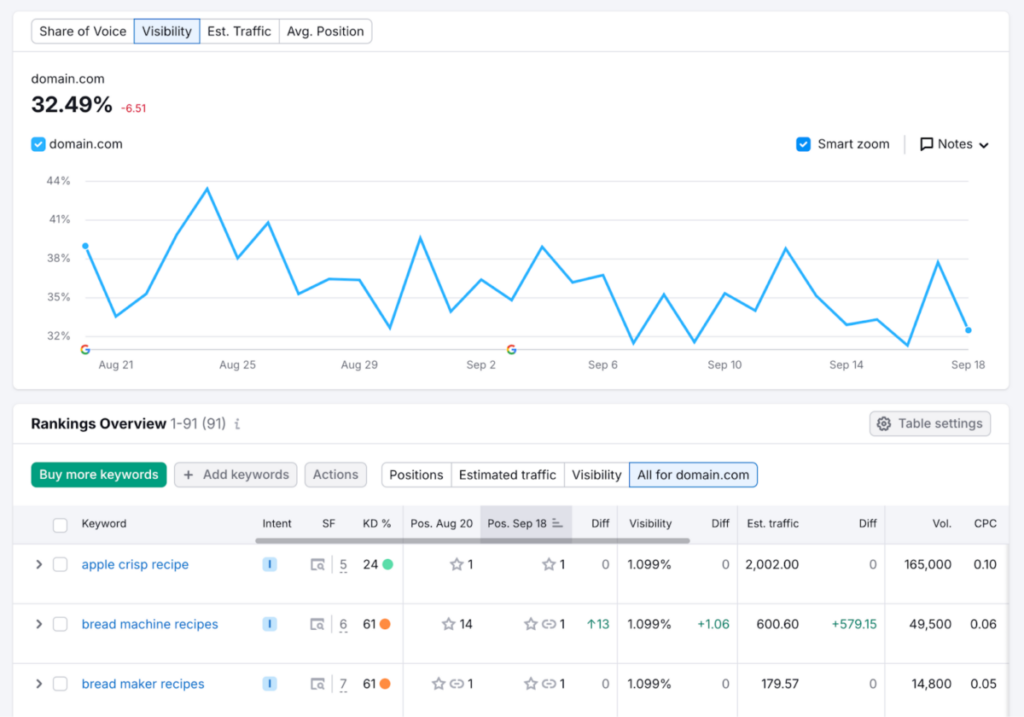
Position Tracking tool
After identification, go through these pages to see what you can repurpose into other formats or for different platforms. Maybe you can convert a table into an infographic to post on social media. Or, there’s a section that would make an excellent script for your YouTube video.
For example, if you have an article in which you share insights from top industry experts, you can convert it into a video script or even an infographic. Use this simple prompt:
Create an infographic based on the provided data.

ChatGPT output
The ChatGPT-generated visual works quite well as a reference. Don’t use it as the final material since the tool has a tendency to use the same design for different prompts. The style often feels repetitive, limiting creative diversity, and text elements like letters are blurred or poorly rendered. So, these visuals are better suited for brainstorming or concept development. Consider them a rough framework to build on with professional design tools.
AI-Powered User Behavior Analysis and SEO Strategy Adjustment
A big part of SEO is tailoring your website to the target audience. After all, they're the ones reading and benefitting from your content. So, you have to analyze their behavior and determine why they may be doing what they're doing. For example, if your website has a high bounce rate, why are people leaving so quickly?
You can use the Semrush Domain Overview tool to get a comprehensive view of how much traffic you're getting, which countries the traffic is coming from, which keywords it's coming for, and which intent your website is satisfying best. With the insights you find here, you can improve user experience and tweak your SEO strategy through ChatGPT's assistance.
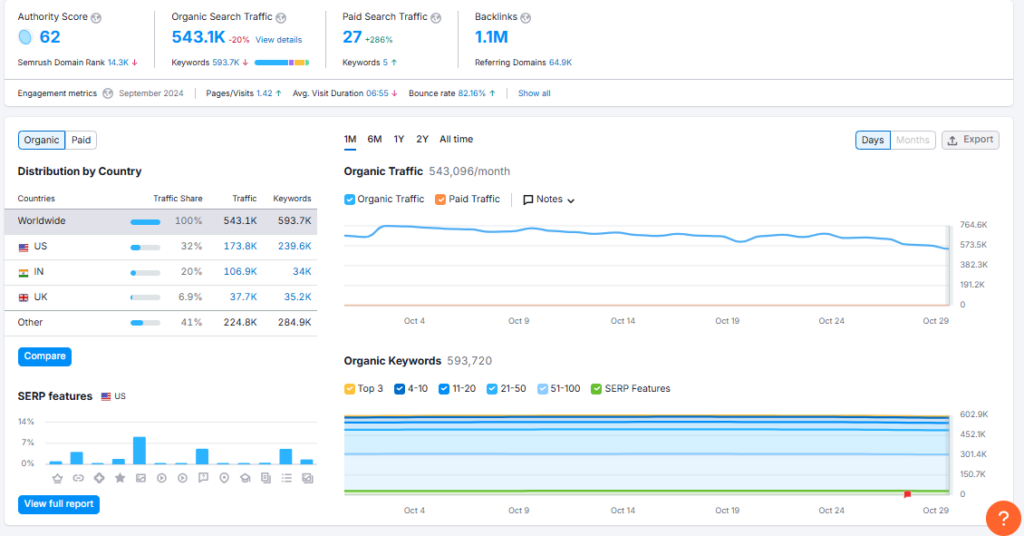
Domain Overview
For example, the SERP features section in Domain Overview showed us that we don't rank for a lot of videos or video carousels. ChatGPT can help conduct video SEO to ensure we appear higher in search results.
It can create an optimized title for our video. ChatGPT doesn’t support direct video uploads or processing at the moment so you’ll have to explain to it what the video is about. Also, feed it the titles of videos currently ranking on the first page. Then, use this prompt:
Recommend optimized video titles based on these SERP results and my video description.
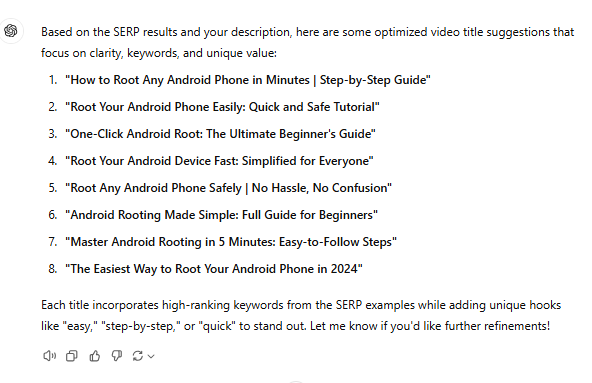
ChatGPT output
You can further ask ChatGPT to create a schema markup for your videos, too. These help Google understand what your videos are about, increasing the chances of being ranked. A simple prompt like this would work.
Create a schema markup for my video with this title (your title).
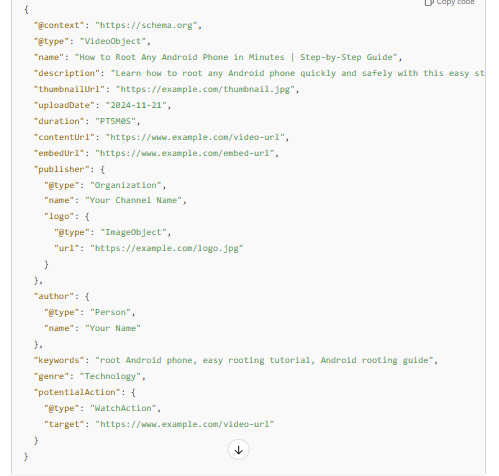
ChatGPT output
ChatGPT will add placeholder text for all video specifications. You can then replace them with the actual specifications of your video. After making these changes, go back to Semrush to see if video SEO has improved for your website.
AI-Driven Multilingual and International SEO Strategies
ChatGPT SEO strategies are not limited to your locality. You can also use them for international SEO and that too in multiple languages. While the exact number of languages supported by ChatGPT isn't shared by its creators, the general consensus is that the figure is over 50, with some claiming it's 85.
While some marketers conduct keyword research in English and then translate it into other languages, this can lead to inaccuracies and overlooked cultural nuances. Instead, you can use the Semrush Keyword Magic Tool to find keywords in multiple languages. Just select your country from the drop-down menu, and the tool will show you keywords in the regional language.
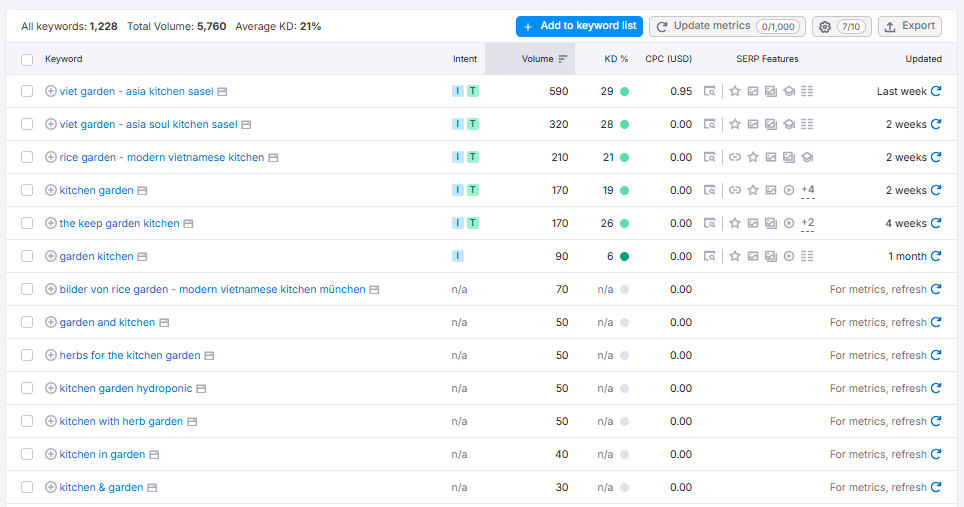
Keyword Magic Tool
Once you have a keyword list, you can analyze it in ChatGPT for multiple SEO purposes. For example, you may use it to create a content outline. We recommend using a custom GPT for this since it would already be trained to base an outline on indicators like user intent and audience pain points.
Otherwise, you’d have to input all these details yourself. For example, you’ll have to include SERP results, target audience information, user intent, and pain points in your prompt, which can make it a bit complicated. Instead, use the same SERP analysis GPT that we discussed earlier.
After you’ve used it to conduct a detailed SERP analysis, use this prompt to create a content outline:
Create a content outline based on the SERP analysis you’ve conducted.
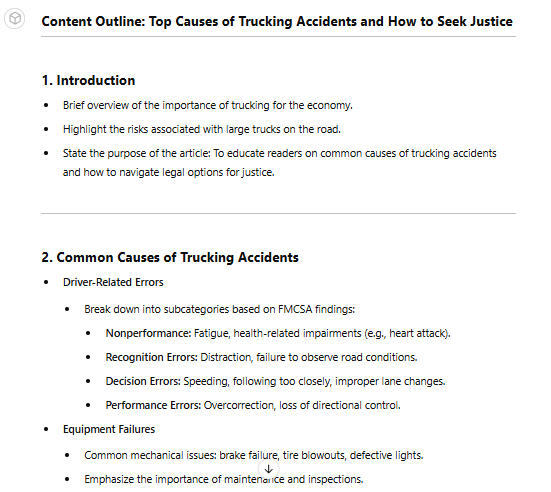
ChatGPT output
This content outline will be fully aligned with user intent and target audience’s requirements. Plus, it will include sections currently ranking articles cover. Now, a content writer or editor who speaks the language can translate this outline.
Maybe you have a German content writer to create content for your website or blog, but you need assistance with on-page SEO optimization elements like meta descriptions, image alt tags, and title tags. ChatGPT can generate these elements in German with this prompt:
Write a meta description in German for an article on growing a kitchen garden for first-timers. Mention that the guide contains a checklist for the items the reader will need to get started. Keep the meta title length to 50–60 characters.
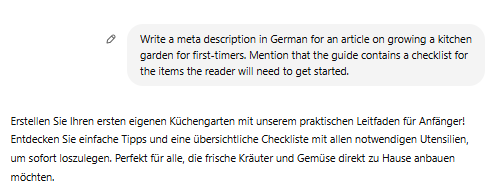
ChatGPT output
Again, make sure someone adept at the language goes through this output. They should look for cultural nuances and offensive language to ensure your content doesn’t land you in reputational trouble.
ChatGPT can also create hreflang tags for international versions of your website. Here’s a simple prompt:
Generate hreflang tags for my blog post for (country 1) and (country 2).

ChatGPT output
Enhancing SEO Performance: Metrics and Optimization
While ChatGPT cannot measure your site's performance due to its inaccessibility to real-time data, it can definitely help you make sense of the metrics you've tracked through a dedicated SEO tool like Semrush.
For example, the Traffic Analytics tool gives you insights into your site's overall traffic, including the number of visits and unique visitors. It also shows you the average visit duration and bounce rate, which you can use to gauge the quality of your site's traffic. If you notice a downward trend in any of these metrics, get ChatGPT to suggest corrective actions to improve them.
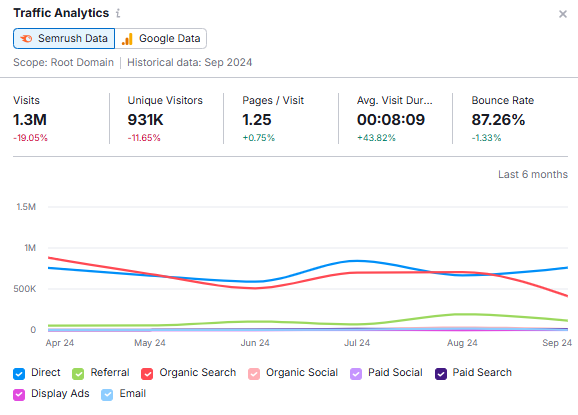
Semrush traffic analytics
The On Page SEO Checker tool further suggests ideas to improve your site's SEO based on competitive analysis. You can use it to get strategy, backlinks, technical SEO, user experience, and SERP feature ideas. Take the suggestions from here and run them through ChatGPT to discover ways to implement them on your website. The use of ChatGPT to write featured snippets that we’ve shown earlier is a good example of this.

Semrush on-page SEO checker
The Semrush Site Audit tool is another excellent resource for measuring SEO performance, particularly in the technical domain. It crawls your site and identifies issues that might be hindering your search rankings, such as those related to markup, internal linking, crawlability, HTTPS, and site performance.
Let's say Semrush shows that your site's crawl budget is being wasted on permanent redirects. Ask ChatGPT for a fix.
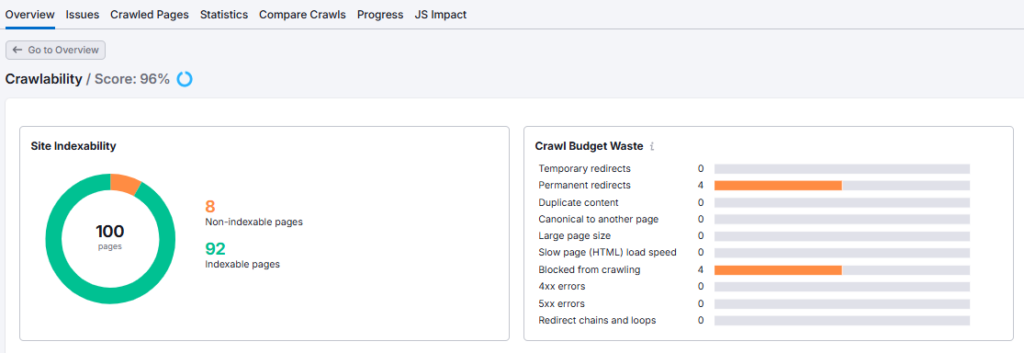
Semrush site audit
Download the Site Audit data from Semrush and upload it to ChatGPT. Then, use this prompt to find ways to improve your site’s technical SEO based on Semrush’s analysis.
Analyze this technical SEO audit data from Semrush and recommend improvements to eliminate these issues.
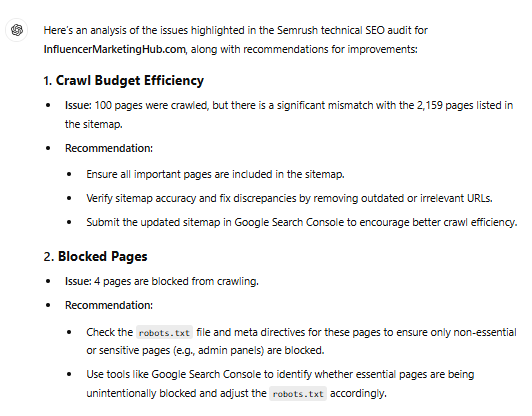
ChatGPT output
Similarly, in the Site Performance tab, Semrush may show you that your site has unminified JavaScript and CSS files.
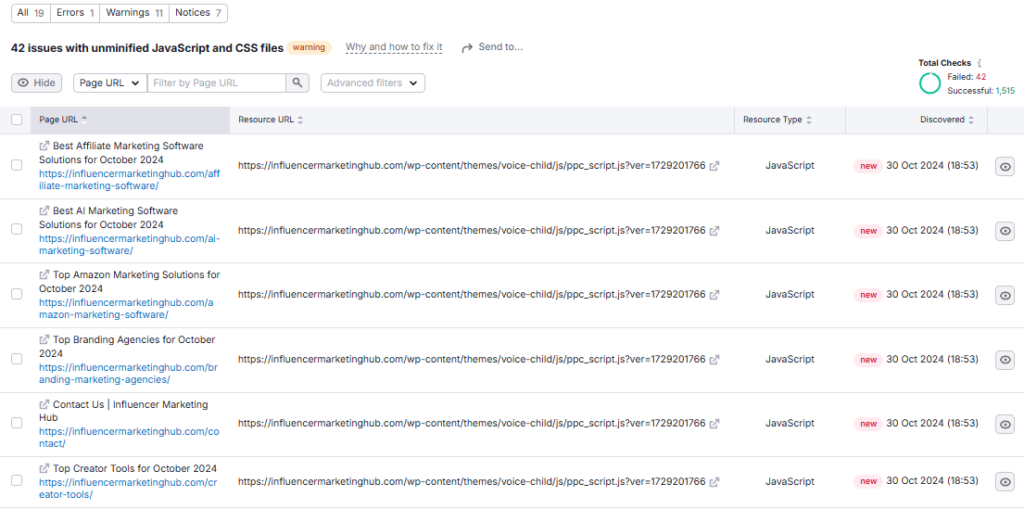
Semrush site audit
Again, you can upload this report to ChatGPT and ask it for corrective recommendations. Use this prompt:
Analyze this website performance report from Semrush and recommend improvements.
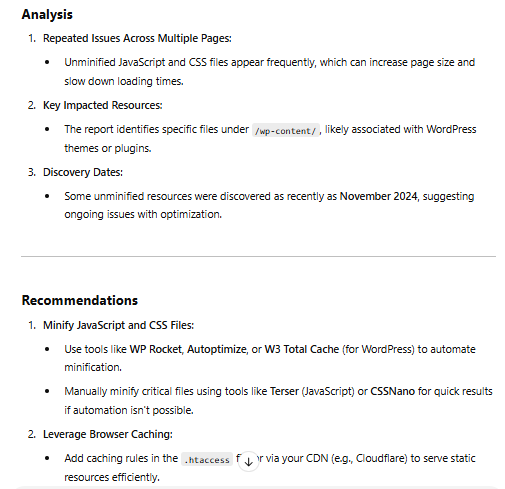
ChatGPT output
While ChatGPT can analyze reports and provide actionable recommendations, it has limitations when dealing with highly technical or granular issues in website performance. For example, it cannot directly access or execute the underlying JavaScript or CSS files to validate minification or test performance improvements in real time.
Plus, its analysis is based solely on the data provided. It cannot dynamically explore or interact with live environments to uncover deeper insights, such as real-world rendering issues or user experience bottlenecks. So, you should complement ChatGPT’s suggestions with specialized tools like Google PageSpeed Insights and Semrush for detailed diagnostics and implementation validation.
Optimizing Content Strategy with ChatGPT
ChatGPT not only helps you rank higher on Google but also ensures you retain this position. Simply put, it lets you create content at scale while maintaining quality and capitalize on other growth opportunities to stay competitive.
Suppose you want to create all relevant content around a seed keyword. You can first build a content plan using the Semrush Keyword Strategy Builder. This tool creates a comprehensive strategy comprising pillar pages and subpages to cover your main topics based on the keywords you provide.
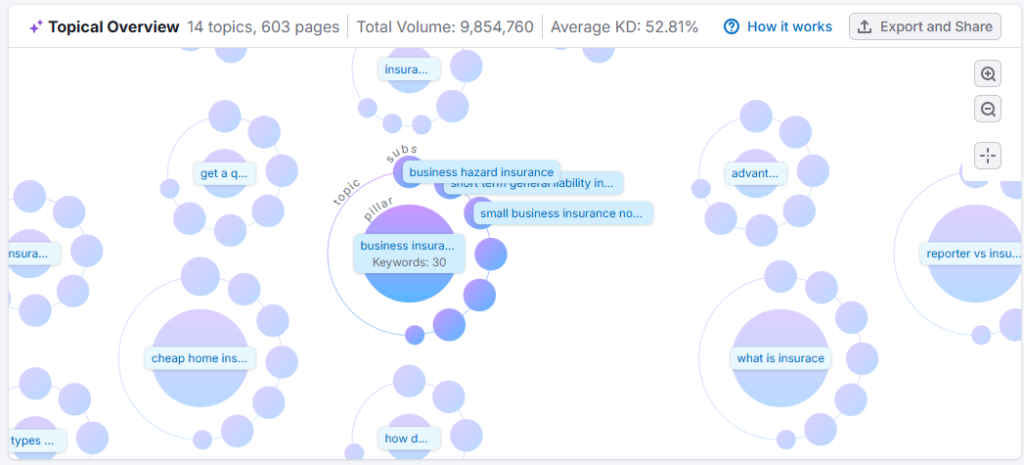
Keyword strategy builder
You can also see the top 10 questions and headlines for a keyword that you may prioritize if you have limited resources. However, the tool may suggest hundreds of topics that would take you months to write.
However, to avoid creating generic content, we recommend using the 4C approach we discussed in our guide on AI SEO tips. The framework essentially stipulates that your prompts should comply with four Cs: characterization, contextualization, customization, and clarity.
You should input your writing style and tone in ChatGPT to let the tool understand your brand voice and mimic it. Then, provide a backdrop in which you're writing this content and customize your prompts for the audience you're targeting. Clarity is another important factor, indicating that the prompts should meet your intentions as closely as possible.
You may also refine your content with additional elements, like a graph or a table. For example, if you're writing an article on organic and paid marketing, you can create a table to compare the two using ChatGPT.
Generate a table comparing organic and paid marketing. Also, give examples of both.
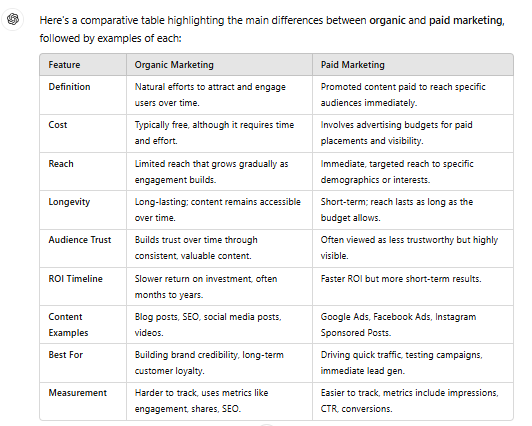
ChatGPT output
Potential Drawbacks and Limitations of ChatGPT in Advanced SEO
Although ChatGPT marketing strategies can be quite helpful, they have shortcomings when it comes to advanced SEO. For one, over-reliance on ChatGPT can lead you away from manual research and analysis, which is imperative for advanced and highly technical SEO tactics. ChatGPT also lacks the ability to understand context fully, which can result in generating irrelevant content ideas or outreach templates for link-building.
Also, ChatGPT may be able to explain site issues and suggest fixes, but that's all it can do. It cannot help you implement the actual fixes, which requires technical knowledge and skills.
Although Google doesn't explicitly mention opposing AI content, the 2024 core update cracked down on scaled content. If you're not using ChatGPT responsibly, you could be penalized for thin or duplicate content.
You need the right balance of ChatGPT, a specialized SEO tool, and human intervention to get ChatGPT strategies to work. While the SEO tool provides real-time data and competitor analysis, human involvement manages the creativity and strategic mindset required for advanced SEO. As for ChatGPT, it can make SEO tasks easier and quicker to scale SEO strategies.
Rank It Up With ChatGPT SEO
There's no shortage of ChatGPT prompts for SEO, whether your needs are keyword-related or content-based. It's the way you use these prompts in combination with your SEO expertise that will produce results.
ChatGPT's potential isn't limited to keyword research alone. You can use it for user behavior analysis, international SEO, content gap analysis, content clustering, and so much more. However, don't only rely on ChatGPT as its responses are not data-driven. You'll need to get this data from an SEO tool that updates daily, Semrush being an excellent option.
For example, while Semrush finds AI SEO keywords, ChatGPT can assist in content ideation. Do the same with every other use case you choose to adopt. With this approach, you'll achieve a noticeable improvement in your SEO results.
Frequently Asked Questions
How does ChatGPT assist in off-page SEO?
ChatGPT can be a game-changer for off-page SEO by helping you brainstorm ideas for link-building, social sharing, and content partnerships. It can generate engaging outreach emails, suggest content formats that attract backlinks, and even help with influencer outreach scripts. Plus, it's useful for finding communities or forums where your content might be shared, boosting its visibility. You can also use ChatGPT to get suggestions for link magnets and then create them within the tool.
What are the limitations of using ChatGPT for SEO?
ChatGPT is great for SEO, but it does have some limitations. For one, it doesn't do real-time data analysis, so it can't check live keyword trends or analytics; you'll still need tools like Semrush for that. Also, while it can create solid content, it may not always capture your brand's specific tone without some tweaking. Another thing is that it can give general advice on SEO best practices but may lack the nuance or creative strategy a human SEO expert brings.
Is it safe to rely solely on ChatGPT for SEO content?
You shouldn't simply copy content from ChatGPT and paste it into WordPress. Google doesn't restrict AI content, but the search engine has strict guidelines on relevance and authenticity that ChatGPT often fails to meet. Plus, ChatGPT doesn't always have the latest updates on SEO algorithms or trends, so you might miss out on certain things. So, it's best to use ChatGPT as a starting point and then refine the content with your expertise and insights.
How do I make AI-generated content feel more human?
Start by adding personal anecdotes or relatable examples that reflect your experiences. Use a conversational tone, as if you're chatting with a friend, and sprinkle in humor or personality where appropriate. Also, don't forget to ask questions or encourage reader engagement, which helps create a connection. Adding self-conducted research and personal insights can also make your content sound more human.
What's the best approach for integrating ChatGPT with other SEO tools?
When using ChatGPT with other SEO tools, use the latter to get real-time data and then let ChatGPT do the ideation and generation. For example, use Semrush to get up-to-date keyword data and ChatGPT to sort those keywords into clusters. Similarly, you can use ChatGPT to generate content. But run its content through SEO tools to analyze its quality and SEO-friendliness before publishing.
Can ChatGPT help me avoid SEO penalties?
At best, ChatGPT can suggest ways to avoid obvious SEO mistakes, such as keyword stuffing or plagiarism. However, you'll have to implement all these strategies yourself. Plus, you should check your website in a site audit tool to see if it meets SEO guidelines. ChatGPT can't do this for you; it can suggest fixes, though.
How can ChatGPT help build topical authority faster than traditional SEO methods?
ChatGPT can speed up the process of building topical authority by quickly generating a wide range of content ideas and outlines based on specific topics. You can use it to create in-depth articles or guides that cover various angles of a subject. If you have conducted keyword research through a traditional SEO tool like Semrush, ChatGPT can also help create content clusters, which you can then create content on to build authority in your niche.
What are the best KPIs to track when using AI-driven SEO strategies?
Here are some of the best KPIs to track in AI-driven SEO strategies:
- Search engine ranking (traditional and AI-assisted search engines)
- Organic traffic
- Click-through rate
- Indexed pages
- Backlinks
- Engagement rate
How can I leverage AI for international SEO and multilingual optimization?
An AI keyword research tool that supports multiple languages can help you find user queries in your target audience's country and language. Similarly, AI tools can create localized content, address cultural nuances, create meta tags in local languages, and conduct automated content translation for multilingual optimization. AI analytics tools can further assist in monitoring the performance of your keywords in different countries and languages.



